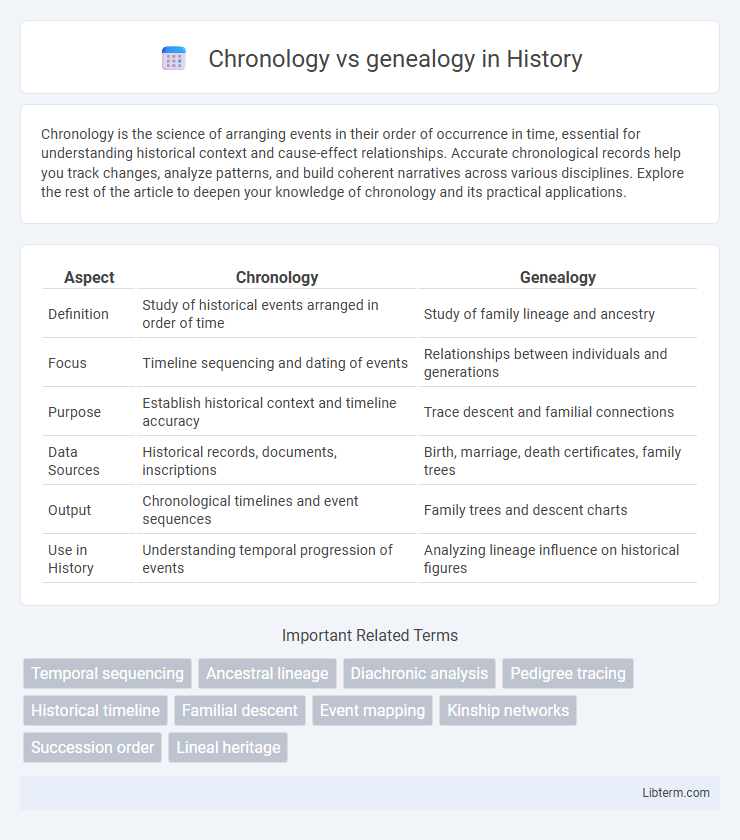Chronology is the science of arranging events in their order of occurrence in time, essential for understanding historical context and cause-effect relationships. Accurate chronological records help you track changes, analyze patterns, and build coherent narratives across various disciplines. Explore the rest of the article to deepen your knowledge of chronology and its practical applications.
Table of Comparison
| Aspect | Chronology | Genealogy |
|---|---|---|
| Definition | Study of historical events arranged in order of time | Study of family lineage and ancestry |
| Focus | Timeline sequencing and dating of events | Relationships between individuals and generations |
| Purpose | Establish historical context and timeline accuracy | Trace descent and familial connections |
| Data Sources | Historical records, documents, inscriptions | Birth, marriage, death certificates, family trees |
| Output | Chronological timelines and event sequences | Family trees and descent charts |
| Use in History | Understanding temporal progression of events | Analyzing lineage influence on historical figures |
Understanding Chronology: Definition and Importance
Chronology is the science of arranging events in their order of occurrence in time, crucial for accurately understanding historical contexts and cause-effect relationships. Unlike genealogy, which traces individual family lineages and ancestral relationships, chronology provides a broader framework to situate those events within a temporal sequence. Mastering chronology enables historians and researchers to construct timelines that clarify the progression and interconnection of events across different periods and cultures.
What Is Genealogy? An Overview
Genealogy is the study of family history and lineage, tracing ancestors and descendants through documented records such as birth, marriage, and death certificates. It involves constructing family trees to map relationships across generations, revealing hereditary patterns and cultural heritage. Unlike chronology, which focuses on the sequence of events over time, genealogy emphasizes connections between individuals and their familial context.
Key Differences Between Chronology and Genealogy
Chronology organizes events in sequential time order, emphasizing when events occurred, while genealogy traces family lineages and relationships, concentrating on ancestral connections. Chronology utilizes timelines and dates to provide a temporal framework, whereas genealogy employs family trees and records to map descent and heritage. The primary distinction lies in chronology's focus on time sequence and genealogy's focus on biological or familial links.
The Role of Chronology in Historical Research
Chronology serves as the foundational framework in historical research, enabling scholars to accurately sequence events and establish causality. By organizing dates and timelines, chronology helps historians contextualize developments within specific periods, enhancing the interpretation of historical processes. The integration of chronological data ensures that genealogical studies are grounded in accurate temporal references, bridging personal histories with broader historical narratives.
Genealogy: Tracing Family Lineages
Genealogy involves systematically tracing family lineages through historical records, DNA analysis, and oral histories to uncover ancestral connections and heritage. This process provides valuable insights into inherited traits, cultural backgrounds, and migration patterns across generations. Genealogical research enhances understanding of personal identity by linking individuals to specific familial and historical contexts.
Methodologies: Chronological vs Genealogical Approaches
Chronological approaches organize information sequentially by time, emphasizing dates, events, and historical timelines to build a clear temporal context. Genealogical methodologies focus on tracing lineage and relationships, using family trees and hereditary connections to understand ancestry and heritage. Chronology provides a time-based framework, while genealogy maps relational structures, both essential for comprehensive historical analysis.
Applications in Academic and Personal Research
Chronology organizes events in a temporal sequence, essential for historical analysis and understanding the progression of eras, while genealogy traces lineage and family relationships, crucial for personal identity and heritage research. In academic contexts, chronology supports the study of cause and effect across time periods, whereas genealogy aids anthropological and sociological investigations into familial patterns and migrations. Personal research benefits from genealogy by uncovering ancestral origins, and from chronology by contextualizing life events within broader historical frameworks.
Challenges in Building Chronological and Genealogical Records
Challenges in building chronological records often involve accurately dating events and resolving conflicting sources, which demand rigorous cross-referencing of historical data and verification through reliable artifacts or documents. Genealogical record construction faces obstacles such as incomplete lineage information, name variations, and undocumented familial connections, requiring advanced research techniques and genetic testing to validate relationships. Both disciplines rely heavily on meticulous documentation and critical analysis to overcome inconsistencies and gaps in historical and familial information.
Tools and Resources: Timelines vs Family Trees
Timelines serve as essential tools in chronology, allowing precise mapping of events across dates to understand historical sequences and durations effectively. Family trees provide a structured genealogical resource, visually displaying relationships and lineage connections among ancestors and descendants. Both tools complement each other by offering chronological context through timelines and relational clarity through family trees.
Choosing the Right Approach: When to Use Chronology or Genealogy
Selecting the right approach depends on the research goal: chronology organizes events in a sequential timeline to understand historical progression and causality, while genealogy traces lineage and family connections to reveal hereditary patterns and relationships. Use chronology for analyzing cause-and-effect relationships across time or constructing timelines of significant events. Opt for genealogy when investigating ancestry, family history, or inheritance patterns that require detailed mapping of individual connections across generations.
Chronology Infographic

 libterm.com
libterm.com